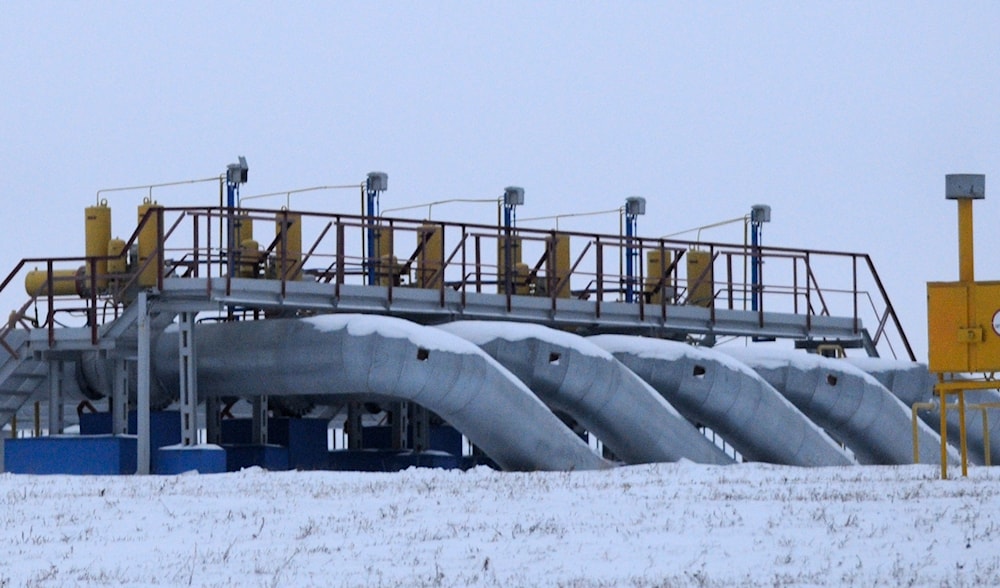Ukraine faces US pressure over Russian gas transit
A senior economist in Kiev has characterized the Trump administration’s latest stance in negotiations as a form of "colonial-style coercion."
-
 The gas pumping station at Sudzhe, Russia, seen on January 11, 2009. (AP)
The gas pumping station at Sudzhe, Russia, seen on January 11, 2009. (AP)
The United States has reportedly demanded control over a critical gas pipeline in Ukraine that transports Russian natural gas to Europe—a move being described as a "colonial shakedown."
According to reports, US and Ukrainian officials met on Friday to discuss a proposed minerals-for-security deal, with US President Donald Trump pushing for Ukraine to transfer control of its natural resources as "payback" for weapons previously delivered by the Biden administration.
Reuters reported that negotiations have become increasingly tense. The latest American proposal, significantly more aggressive than a February draft, includes demands for $500 billion worth of rare metals, oil, and gas and for the US International Development Finance Corporation to take over management of the gas pipeline.
The pipeline in question originates in Sudzha, western Russia, and stretches roughly 750 miles (1,200 kilometers) to Uzhhorod on Ukraine’s western border with the EU and Slovakia. Built during the Soviet era, the pipeline is a strategic piece of infrastructure and a major conduit for European energy supplies.
Wider context
On January 1, Ukraine halted the pipeline’s gas transit after a five-year contract with Russia’s Gazprom expired. The agreement had previously generated hundreds of millions of euros in transit fees for both nations, even during the early years of the beginning of the war in Ukraine.
Volodymyr Landa, a senior economist at the Kiev-based Centre for Economic Strategy, criticized Washington’s approach, saying the Americans were after “all they can get.” He described the US position as "colonial-type" bullying and predicted it would be unacceptable to Ukraine.
Last year, President Volodymyr Zelensky floated the idea of granting the United States access to Ukraine’s untapped mineral reserves. He envisioned a partnership in which a future Trump administration would supply arms in exchange for shared profits from joint ventures.
However, Trump has since withdrawn any offer of security guarantees or military assistance while still demanding access to the resources. Last week, he accused Zelensky of trying to “back out of an agreement” and warned that Ukraine’s president would face “big problems” if he failed to comply.
On Thursday, Zelensky told reporters he remained open to a development deal but insisted it must be equitable. “I am just defending what belongs to Ukraine. It should be beneficial for both the United States and Ukraine. This is the right thing to do,” he said, adding that any agreement must ensure "parity" with revenues split "50-50."
A US Treasury spokesperson confirmed that "technical" talks are ongoing.
Kellogg walks back Ukraine partition remark
Meanwhile, US special envoy, Keith Kellogg, attempted to clarify controversial comments he made about partitioning Ukraine. In an interview with The Times, he suggested the country could be split “almost like Berlin after World War Two.” On X, Kellogg later explained he had been referring to a “post-ceasefire resiliency force in support of Ukraine’s sovereignty,” not endorsing what he labeled as "Russian occupation".
Under this proposed framework, Russian forces would remain in the areas they currently control, while British and French troops would be deployed to Kiev and other parts of Ukraine.
In a separate development, Trump’s special envoy, Steve Witkoff, reportedly met with Russian President Vladimir Putin in St. Petersburg. Witkoff is said to have proposed ceding four Ukrainian provinces to Russia—including areas currently under Kiev’s control and home to over one million people—as part of a conflict resolution plan.
At a Friday meeting of the Ukraine Defense Contact Group, Western allies announced a record €21 billion ($22.5 billion) in new military assistance. They also accused Putin of stalling on a proposed 30-day ceasefire that Ukraine has already accepted.
Russia responded with renewed airstrikes early Saturday, targeting civilian infrastructure. Separately, President Zelensky on Saturday honored 26-year-old F-16 pilot Captain Pavlo Ivanov, who was killed during a combat mission. He praised Ukraine’s small air force for “heroically” defending the nation from Russian aerial assaults and supporting ground forces.
Read more: US 'lost war with Russia', 'eliminated' Ukraine: Carlson

 4 Min Read
4 Min Read










